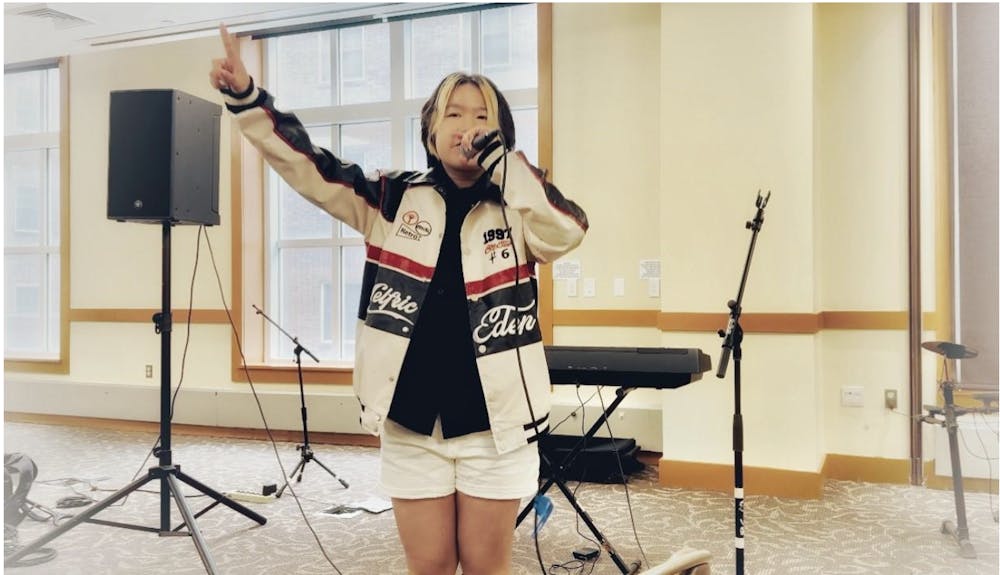
Last year around this time, I shared the secret weapon I had discovered in my lifelong battle with a stutter: the beat. The relentless, driving rhythm of a hip-hop track was more than music — it was a blueprint for fluency. I could speak with a force and clarity that felt both superhuman and, somehow, like the most authentic version of myself.
But what happens when the music stops?
This year, I found out when I started speech therapy. The decision to start speech therapy wasn’t a surrender or an admission that the beat had failed me. The confidence I had on the mic was real, but I wanted to find that same ease when ordering coffee, answering a discussion question or just talking to a friend in a quiet study room. I was fluent in performance, but I wanted to be fluent in the unscripted moments that make up a life.
The contrast was immediate and jarring. In rap, I learned to attack the words, to push them forward with percussive energy from the chest. It’s a world of momentum and power, where you command the language and bend it to the rhythm.
This is not the case in speech therapy; I was being asked to do the exact opposite: to be gentle, to dismantle the machine and rebuild it with gentler parts.
It started with breathing. Not the sharp, hurried gasps for air between bars, but deep, controlled breaths. My speech pathologist had me place my hand on my stomach, making it rise and fall slowly. The goal was to power my voice from my core, not from the tension in my shoulders and chest. It felt unnatural, like learning to walk backward.
From there, we moved to the sounds themselves. My speech pathologist introduced concepts that felt completely alien. Instead of hitting a consonant hard, we practiced “gentle onsets,” starting vowel sounds with a gentle breath, like a sigh of relief before the word even began. We practiced what she called “soft contacts,” also known as light articulatory contacts. Instead of holding my tongue against my maxilla to make a ‘t’ sound, I was taught to let it flow across the surface of my tongue. Instead of my lips pressing together hard for a ‘p,’ they were to meet gently like book pages. Instead of filling every available space with sound, we practiced pausing, learning to find comfort in the silence between thoughts. It was a vocabulary of subtlety and release, not force and control. It was, in one word, terrifying.
For the first few weeks, I felt a sense of internal betrayal. My mind and muscles, trained for years to find safety in rhythm, resisted this new softness. In moments of conversational stress, my instincts screamed for a forceful beat pattern to lock into.
Yet, slowly, something began to shift. The breakthroughs weren’t dramatic; they didn’t happen on a stage or in front of a crowd. One happened in a random coffee shop that I had never before stepped foot inside, when I asked a question at the cashier and the words came out smoothly, without preparation or a push of force. Another happened over the phone during my shift at the Creative Media Center, a situation that has always been as challenging as a personal Everest, when I finished a conversation in a slow, steady but gentle cadence.
These small victories felt different. They weren't the triumph of nailing a complex verse fueled with adrenaline; they were a tranquil, quiet sense of peace.
My definition of “fluency” is expanding. It isn’t just about a flawless delivery of a 16-bar verse anymore. It's also about the calmness, the subtlety and the comfortable confidence it takes to simply speak your mind in the moment.
I haven’t put down the mic. Rapping is still my art and my power. But I now think of it as part of a larger vocal toolkit. The beat is my power tool, perfect for building something expressive and strong. These speech therapy techniques are my precision tools, designed for the delicate, everyday art of connection.
Kaiyuan Du is a senior from Beijing, China studying Molecular and Cell Biology and History of Science, Medicine and Technology.





